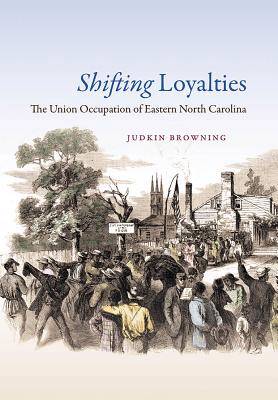
Bedankt voor het vertrouwen het afgelopen jaar! Om jou te bedanken bieden we GRATIS verzending (in België) aan op alles gedurende de hele maand januari.
- Afhalen na 1 uur in een winkel met voorraad
- In januari gratis thuislevering in België
- Ruim aanbod met 7 miljoen producten
Bedankt voor het vertrouwen het afgelopen jaar! Om jou te bedanken bieden we GRATIS verzending (in België) aan op alles gedurende de hele maand januari.
- Afhalen na 1 uur in een winkel met voorraad
- In januari gratis thuislevering in België
- Ruim aanbod met 7 miljoen producten
Zoeken
Shifting Loyalties
The Union Occupation of Eastern North Carolina
Judkin Browning
Paperback | Engels
€ 39,95
+ 79 punten
Omschrijving
In the spring of 1862, Union forces marched into neighboring Carteret and Craven Counties in southeastern North Carolina, marking the beginning of an occupation that would continue for the rest of the war. Focusing on a wartime community with divided allegiances, Judkin Browning offers new insights into the effects of war on southerners and the nature of civil-military relations under long-term occupation, especially coastal residents' negotiations with their occupiers and each other as they forged new social, cultural, and political identities.
Unlike citizens in the core areas of the Confederacy, many white residents in eastern North Carolina had a strong streak of prewar Unionism and appeared to welcome the Union soldiers when they first arrived. By 1865, however, many of these residents would alter their allegiance, developing a strong sense of southern nationalism. African Americans in the region, on the other hand, utilized the presence of Union soldiers to empower themselves, as they gained their freedom in the face of white hostility. Browning's study ultimately tells the story of Americans trying to define their roles, with varying degrees of success and failure, in a reconfigured country.
Unlike citizens in the core areas of the Confederacy, many white residents in eastern North Carolina had a strong streak of prewar Unionism and appeared to welcome the Union soldiers when they first arrived. By 1865, however, many of these residents would alter their allegiance, developing a strong sense of southern nationalism. African Americans in the region, on the other hand, utilized the presence of Union soldiers to empower themselves, as they gained their freedom in the face of white hostility. Browning's study ultimately tells the story of Americans trying to define their roles, with varying degrees of success and failure, in a reconfigured country.
Specificaties
Betrokkenen
- Auteur(s):
- Uitgeverij:
Inhoud
- Aantal bladzijden:
- 264
- Taal:
- Engels
Eigenschappen
- Productcode (EAN):
- 9781469613703
- Verschijningsdatum:
- 1/02/2014
- Uitvoering:
- Paperback
- Formaat:
- Trade paperback (VS)
- Afmetingen:
- 155 mm x 237 mm
- Gewicht:
- 535 g

Alleen bij Standaard Boekhandel
+ 79 punten op je klantenkaart van Standaard Boekhandel
Beoordelingen
We publiceren alleen reviews die voldoen aan de voorwaarden voor reviews. Bekijk onze voorwaarden voor reviews.









